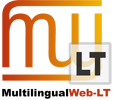News
W3C Launches Work to Simplify Creation of Content in World's Languages
07 March 2012 | Archive
 Today W3C announced new work to make it easier for people to create Web content in the world's languages. The lack of standards for exchanging information about translations is estimated to cost the industry as much as 20% more in translation costs, amounting to billions of dollars. In addition, barriers to distributing content in more than one language mean lost business. Multinational companies often need to translate Web content into dozens of languages simultaneously, and public bodies from Europe and India typically must communicate with citizens in many languages. As the Web becomes more diverse linguistically, translation demands will continue to grow.
Today W3C announced new work to make it easier for people to create Web content in the world's languages. The lack of standards for exchanging information about translations is estimated to cost the industry as much as 20% more in translation costs, amounting to billions of dollars. In addition, barriers to distributing content in more than one language mean lost business. Multinational companies often need to translate Web content into dozens of languages simultaneously, and public bodies from Europe and India typically must communicate with citizens in many languages. As the Web becomes more diverse linguistically, translation demands will continue to grow.
The MultilingualWeb–LT (Language Technology) Working Group will develop standard ways to support the (automatic and manual) translation and adaptation of Web content to local needs, from its creation to its delivery to end users. Read the press release and learn more about the W3C Internationalization Activity. The MultilingualWeb-LT Working Group receives funding from the European Commission (project name LT-Web) through the Seventh Framework Programme (FP7).
W3C Workshop - Using Open Data: policy modeling, citizen empowerment, data journalism
09 March 2012 | Archive
W3C announces today a Workshop on Using Open Data: policy modeling, citizen empowerment, data journalism. For many years, W3C has been a keen promoter of Open Data, fostering a culture in which public administrations make their data available, ideally in machine-processable formats. Many governments have embraced the idea with enthusiasm, setting up national data portals. As part of the FP7-funded Crossover Project, W3C and the European Commission are running a Workshop to ask a simple question: what is all the 'new' government open data being used for? The Workshop takes place 19-20 June in Brussels, Belgium at the European Commission Headquarters. W3C Membership is not required to participate, but participation is limited to 80 people and participants must submit position papers. Workshop participants will focus on uses of open data, not its publication. In particular, the intention is that participants will highlight uses of data for tools that aid policy modeling, that empower citizens, and that can be usefully visualized for data journalism. For more information, see the Workshop home page.
Last Call: CSS Values and Units Module Level 3
08 March 2012 | Archive
The Cascading Style Sheets (CSS) Working Group has published a Last Call Working Draft of CSS Values and Units Module Level 3. This CSS3 module describes the common values and units that CSS properties accept and the syntax used for describing them in CSS property definitions. Comments are welcome through 29 March. Learn more about the Style Activity.
Two Notes Published by the HTML Data Task Force
08 March 2012 | Archive
The HTML Data Task Force, Semantic Web Interest Group has published two Notes today:
- The HTML Data Guide aims to help publishers and consumers of HTML data. With several syntaxes (microformats, microdata, RDFa) and vocabularies (schema.org, Dublin Core, microformat vocabularies, etc.) to choose from, it provides guidance on deciding what to choose in a way that meets the publisher's or consumer's needs.
- The Microdata to RDF describes processing rules that may be used to extract RDF from an HTML document containing micro data.
Both documents are Interest Group Notes, meaning that no further work is planned on the documents themselves, although future Working Groups may use these as input documents for further Recommendation Work.
Learn more about the Semantic Web Activity.
MediaStream Capture Scenarios Draft Published
06 March 2012 | Archive
The Device APIs Working Group and Web Real-Time Communications Working Group have published a First Public Working Draft of MediaStream Capture Scenarios. This document collates the scenarios that are target use cases for the Media Capture API that enables access to media input capabilities for Web applications using Javascript. Learn more about the Ubiquitous Web Applications Activity.


